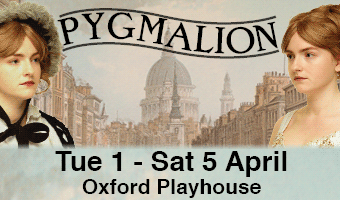Pygmalion was a Cypriot sculptor who despaired of finding a perfect woman and so sculpted one instead: he falls in love with this sculpture and eventually through his prayers she comes alive.
The parallels with this play are clear: Professor Higgins takes this ‘common’ flower girl and creates a lady out of her. In the classic musical My Fair Lady, which is based on Shaw’s play, there is a happy ending: in the play, however, there is no such thing. Yes, Higgins teaches her to speak well and hold herself well and behave like a lady, but this means she no longer belongs anywhere. She can’t go back to being a flower girl, a job with many limitations it is true, but a job where she had choices and where she could earn her own living. As a woman in polite society and with no income of her own, she has very few choices except to find a suitable husband. She is stuck with ‘middle class morality’ as her father puts it – family and marriage being paramount: a woman who earned her own living was often considered to be immoral. Eliza’s father had lived with many women, including Eliza’s mother – his sudden rise to wealth means he has to get married. Perhaps Eliza is somewhat compromised too, having been living with two men: to the outside world that would be suspicious, however much she protests “I’m a good girl I am.” When she leaves, Higgins does want her to come back, but not in any romantic way: he has got used to her being around and misses the comfort of having his slippers fetched for him and so on. There is no romance in the play and no happy ending.
The play has dated to a certain extent: the huge fuss about including the word ‘bloody’ when it was first produced in 1912 seems laughable now and today there are not many flower girls around
The main actors in the play are beautifully portrayed. Eleanor Schofield as Eliza Doolittle manages the transformation from ‘common’ flower girl to lady seamlessly: when she realises that she is no more than a 6-month experiment for Higgins, which he is glad to have completed, her sadness and vulnerability are clear. Vaughan Pierce, as Higgins, meanwhile, is completely heartless and quite unaware of his behaviour. Paul Clifford, as Colonel Pickering, is gentle and kind, and treats Eliza well, but he too doesn’t understand how she must feel. Triona Adams, as Mrs Pearce the housekeeper, is a good foil to Higgins; she understands his foibles and keeps him under control, more or less. Jo Green as Alfred Doolittle, deserves a special mention: he is extremely funny as Eliza’s father, insisting quite proudly that he is part of the ‘undeserving poor’, and he holds the stage when he is there: a wonderful part which he performs admirably. The set is clever and flexible and the whole production works well to bring out the humour, and the pathos, of the play.





